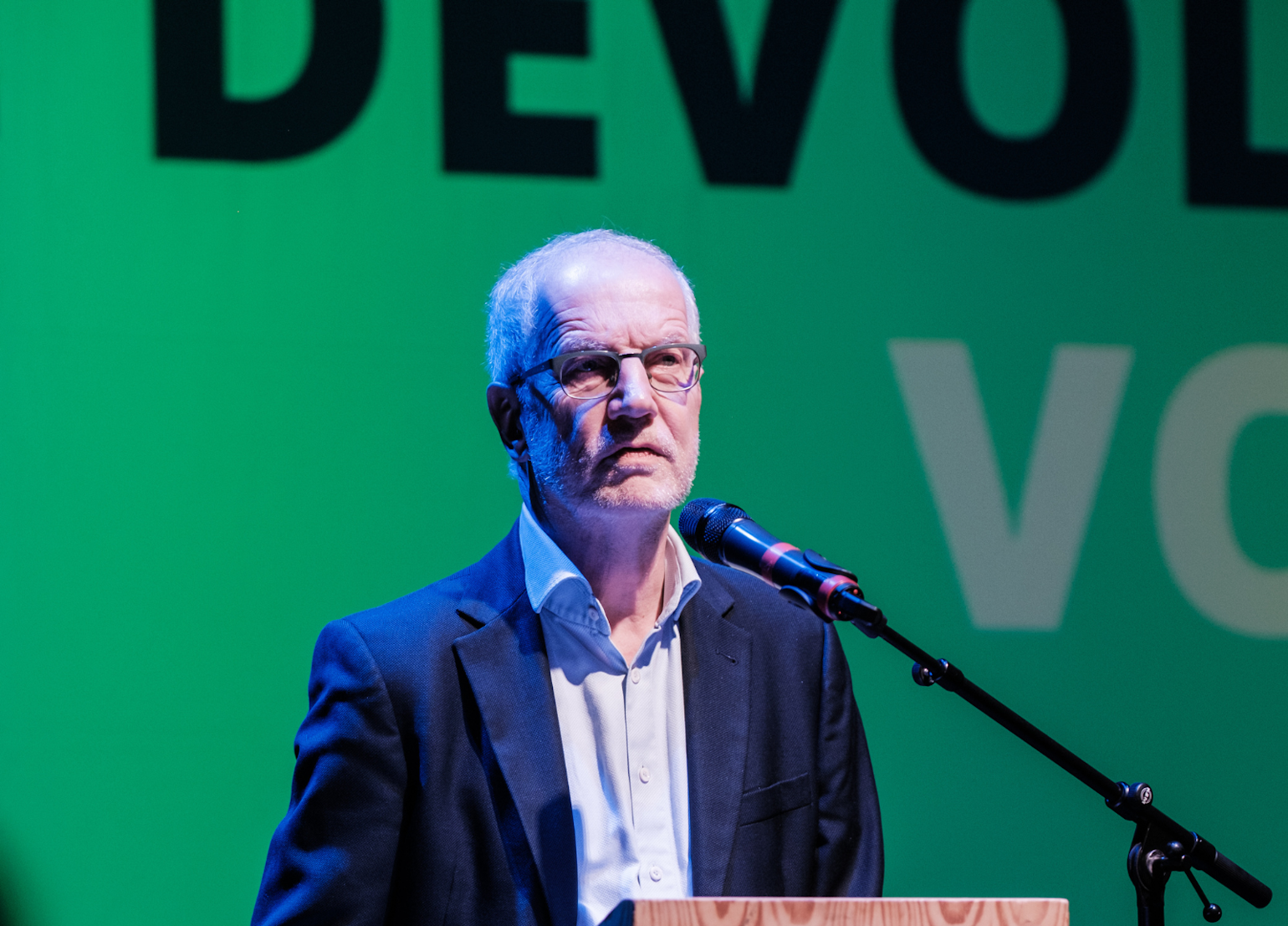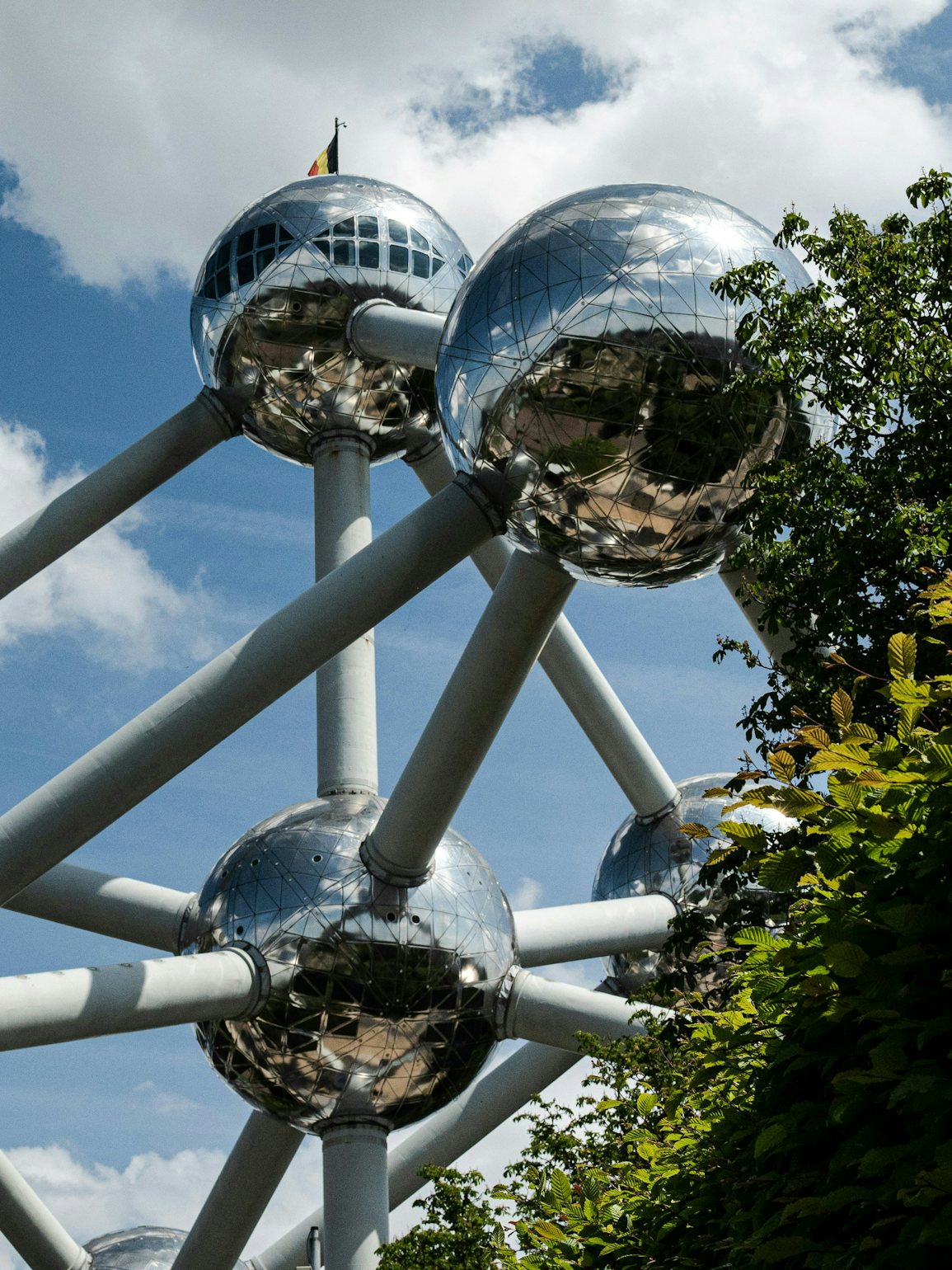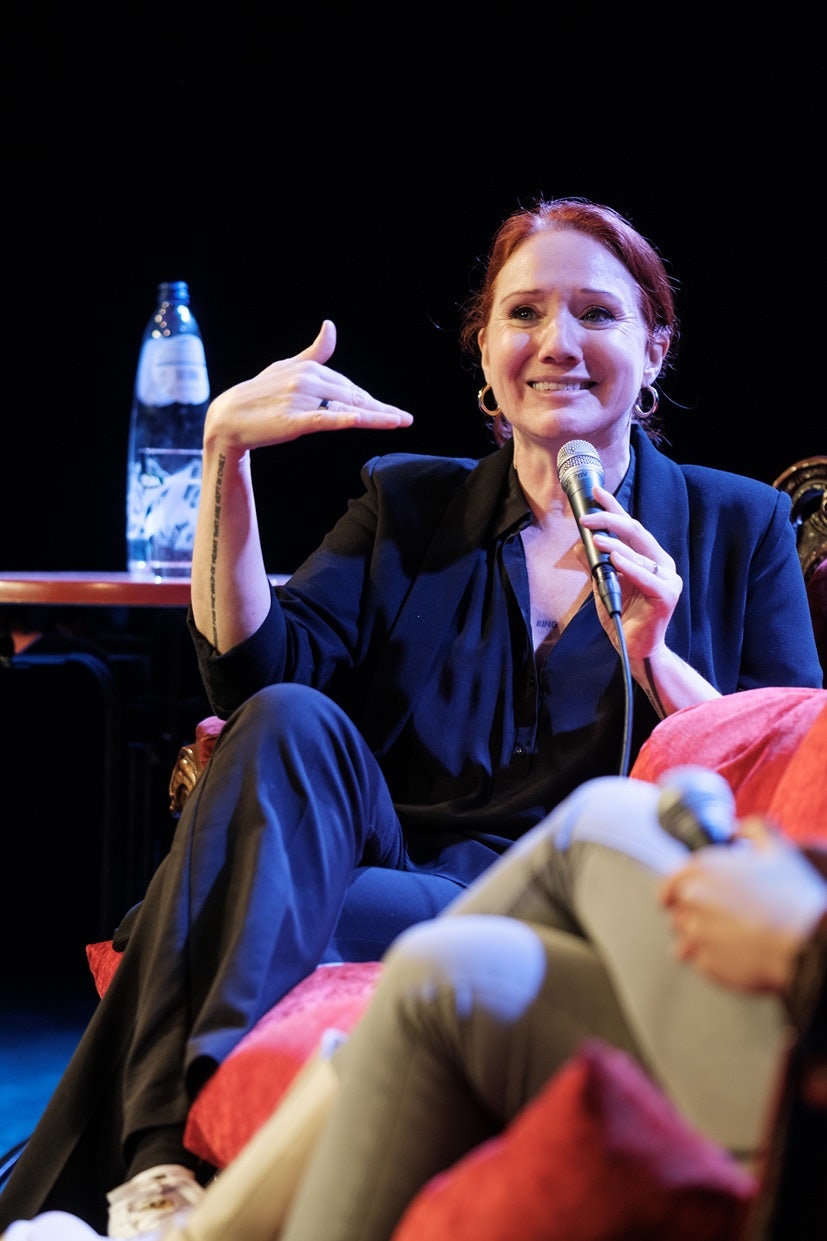The Unbearable Lightness of Flemishness
In November, we were visited by a delegation of Swedes from the Gothenburg Book Fair, at which we will be the host country together with the Netherlands in 2027. The Swedish delegation met several authors and illustrators, and learned about Flanders, the Flemish publishing world and Flemish literature. One of the sessions was an introduction to Flanders by Luc Devoldere, the chairman of our board of directors. This is the speech he gave.

What is Flanders?
The easy answer: the northern, Dutch-speaking part of Belgium. So a Fleming is a Belgian who speaks Dutch. Belgium is a federal state, one of a kind. It has no national political parties, for instance. To form a federal (national) government, Flemish political parties need to negotiate with French-speaking political parties. You could therefore describe Belgium as an ongoing diplomatic conference.
Belgium has three official languages: Dutch is spoken by 60 per cent of the total population, French by around 40 per cent, while some 77,000 Belgian citizens speak German. The latter have all the linguistic and cultural rights they need, including their own government and parliament.
The three languages are spoken in specific territories and are tied to those territories. Dutch is the only official language in Flanders, while French the only official language in Wallonia. A language barrier that runs across the country from west to east, established by law, divides the two major territories.
But the situation is even more complex than that. If you look at the map, the capital, Brussels, is situated in Flanders. About one million one hundred thousand people live there. Brussels is the capital of Belgium, of Flanders and unofficially of Europe. The city is officially bilingual, but make no mistake, the lingua franca is French, although not even half of the households in the city use French at home. Other languages are gaining in importance (Arabic, Berber, Turkish, English...). What proportion of citizens in Brussels speak Dutch? Less than 10 per cent. It’s therefore a thrilling experience to come to Brussels as a Dutch speaker. You never know what’s going to happen. My modest strategy is to start in Dutch and see where that takes me. You combine the rule of law with common courtesy. You just need to be pragmatic and adapt.
So consider this city as multilingual, consisting of 19 municipalities. Some say that Brussels is made up entirely of minorities, living apart together. A thrilling experience. If you are young and educated and have enough money, this is a truly inspiring and vibrant city to live in.
Flanders happens to be the strongest region of Belgium economically. There are financial transfers from Flanders to Wallonia, which is in a more difficult position. Flanders doesn’t want to end this solidarity, but it does ask for more transparency from Wallonia in return. Flanders is convinced that more competencies for all regions will eventually lead to a greater sense of responsibility, whereas Wallonia has more faith in Belgium as a whole to solve its problems. This is what the ongoing diplomatic conference known as Belgium is all about.
Let me return to that language of ours: Dutch. It’s the same language as is spoken in the Netherlands, with some differences in vocabulary and pronunciation that make our common language all the richer. Blessed are the languages spoken in more than one country. Let’s say we are like the Austrians, with the Dutch representing the Germans. But don’t be mistaken: there is only one language, in their case German, that binds them, and only one literature, too. Similarly, one language and one literature binds the Flemings and the Dutch, although a lot of Flemish writers, often the very best, are published in Amsterdam.
But let it be well understood: living in another country, one that’s had a different mentality and history since the separation of the Low Countries at the end of the 16th century, has produced a different kind of literature, rooted in Catholicism, more baroque and with a more Latin atmosphere.
Just as Austria gifted German literature Stefan Zweig and Joseph Roth, we have gifted Dutch literature the great novelists Louis Paul Boon and Hugo Claus, the novelist and playwright Tom Lanoye and the poet Leonard Nolens. They could not have been produced by the Netherlands.
Having said that, one could consider Flanders, and Belgium as a whole, as a nation on the boundary between Northern and Southern Europe, at the interesting divide between Latin and Germanic worlds. It has been said, and rightly so, that Flemings are the most Latin of all the Germanic peoples, because they’ve lived for such a long time next to and together with the French-speaking peoples.
If the Netherlands can be seen as the most American nation in Europe, it is clear that Flanders has always looked south, to France. French has influenced our language. Our cuisine is more or less the same as in France. Our political customs, as seen for instance in the mentality of our parliaments, remain more Latin than those of the parliament in The Hague. The Netherlands definitely belongs to Northern Europe. We don’t really. We just tend to look up to that model, perhaps.
Flemings are also Belgians. Don’t ask me to choose. There are consequences to living together for almost two centuries, since 1830, and in fact even longer if you include the time of what was then called the Southern Netherlands. As a result, in Flanders you can meet people who will describe themselves as Belgians, as Flemings, as Flemings and Belgians, or as Belgians and Flemings.

What is the history of Flanders?
To understand all this better, we have to dive into history – the history of the Low Countries. Politically, the Low Countries consisted of nearly twenty principalities that were more or less united under Burgundian rule (15th century) and Habsburg rule (early 16th century). They comprised what are now Belgium, the Netherlands, Luxemburg and a part of northern France.
The Italian merchant and historian Lodovico Guicciardini, living in Antwerp in the middle of the 16th century, called the inhabitants of the Low Countries “Fiamminghi”: naming them, as a pars pro toto, after the most prosperous inhabitants, those who lived in the county of Flanders, or what are now the Belgian provinces of West- and Oost-Vlaanderen, plus an area of northern France.
Since the early Middle Ages, the Southern Low Countries has been a wealthy European region enjoying economic prosperity and a flourishing culture, a perfect hub at the crossroads of the German empire, France, Great Britain, Scandinavia and the entire Baltic region. It is dominated by its ports, initially Bruges and now Rotterdam, Antwerp, Ghent/Vlissingen (North Sea Port, a unique Dutch/Flemish joint venture) and Zeebrugge – the gateways to Western Europe.
The Southern Low Countries experienced urbanization early on, in Bruges, Ghent and Antwerp. The Reformation, which brought Protestantism, swept across the Low Countries from south to north over the course of the 16th century.
What about the Dutch language in Flanders?
Let me return to the language issue, rather in the way that a dog returns to its bone. The language situation in Flanders is complex and complicated. In 2024 most Flemings speak a dialect, or an intermediate language, and/or standard Dutch. There is nothing wrong with that as such. Varieties and registers exist and they enrich our language. We find similar differences in other languages, both those that are widely spoken and those that are relatively minor.
Language continues to be the most important element in Flemish nation-forming. Could it have been otherwise? Flemings are sensitive to language because for a long time the Kingdom of Belgium accepted and acknowledged, de facto, only one language: French.
At the end of the 19th century the Flemish movement opted for the standard language, in other words Dutch as it was spoken and written in the Netherlands, having little choice but to promote and use this particular variety as opposed to the dominant French language. It was not until the 1930s, with the advent of radio and the ‘Dutchification’ of education, that standardisation of the language really got going.
For the past century the experience of learning Dutch has been, for all Flemings, one of learning a language that is both more or less familiar and more or less foreign. French was the language of the upper classes and the government for many years and Flemings have had to fight for their language rights in Flanders. The battle was concluded in principle from the 1960s on. When Flanders gained the upper hand economically in the sixties, politics had to follow. All this now belongs to history.

Today, French is absent from the public arena in Flanders. Knowledge of French is decreasing among Flemish youngsters, even among the educated. English is everywhere of course, in the minds, hearts, ears and fingers of the young.
Can we define Flemishness, its unbearable lightness?
Around 1900 a fruitful cliché was used to evoke the identity of the Southern Netherlands – or its pars pro toto Flanders, even Belgium – concerning the dichotomy between greedy sensuality and mysticism. The resulting stereotype has long been popular in the German and French worlds. The poet Rilke spoke of “Busse und Kermes”, penitence and carnival, after seeing the Catholic penitential procession on Good Friday in Veurne in 1906. Stephan Zweig, in his book about Émile Verhaeren (1910), spoke of “Lebensfreude”, joy of living, and “Gottsuchertum”, the seeking/yearning for God in the chapter “Das neue Belgien”. In that language game of vitalism and God-seeking, the names of the mystics Hadewijch and Ruusbroek are invariably mentioned; in painting, the peasant Brueghel is set against the refined Van Eyck and the ethereal Memlinc against the exuberant Rubens.
The alternative designation “Burgundian” later came into vogue to indicate greed and sensuality, as an antonym for the rigid and austere “Calvinist”. The first term is heard mainly in the Dutch-speaking region itself, and especially in the north, where to this day Belgians and Flemings are referred to with some envy as “Burgundians”, suggesting they know how to live, or at least how to eat, drink and party. Never use the term in French, because then it refers exclusively to a region of France that was once a duchy. And in English or German the term will not really be understood either.
Let me try to describe Flemishness today, while remaining fully aware of how hard it is to describe oneself. Flemings are not particularly nationalistic, despite having two strong nationalist political parties. They don’t take themselves too seriously, in fact there is a good deal of self-mockery. Their identity is quite layered and hybrid.
Take Jacques Brel, the great Flemish (or Belgian?) chansonnier who sang in French. A year before his death, in 1977, he sang this:
(...) quand les soirs d’orage des Chinois cultivés Me demandent d’où je suis, je réponds fatigué Et les larmes aux dents: "Ik ben van Luxembourg".
(...) when on stormy nights cultured Chinese Ask me where I'm from, I answer wearily And with tears in my voice: “Ik ben van Luxembourg”.
Expressing his hybrid, fragmented identity (Who am I? Where do I come from? What do I speak?), Brel avoided choosing between “Flemish” and “Belgian” identities by using two languages, by opting for a non-identity, that of Luxembourg, a province hanging from Belgium like an appendix. You find yourself part of a place nobody ever hears anything about. It seems to have no history, so it must be a happy little country. Language doesn't seem to be a problem there either – you hear French, German, English – and among themselves the Luxembourgers speak, as a kind of secret language, Letzeburgs.
With Italy, Belgium belongs to the family of “weak” states in Europe. Central power is not very strong, and it is continuously challenged by the checks and balances of civil society. This kind of state is deeply determined by particularism. Recall the early rise of urbanization and therefore the strong identities of cities in the Southern Netherlands.
Or take the poet Leonard Nolens in his poem 'Place and date':
I was born in Belgium, I’m Belgian. But Belgium was never born in me. I was born in Flanders for ever, But Flanders is not where my oldest cradle stood. Flanders is my modern art mother now From whom I didn’t acquire my childhood tongue, Whose heartbreaking gibberish I study. Flanders slowly became my historical father Whose ancestors are not mine.
Flemings keep a low profile; it can take some time to get through to them, but once you do they are friendly and loyal.
Flemings are not all that open in public space. They are cautious, prudent. They perceive the directness and frankness of the Dutch as rudeness.
They like to party and enjoy life after their duties are done.
The are quite secular, although they remain post-Catholic in mentality.
They still sometimes cultivate, without knowing it, a form of mild hypocrisy.
They are liberal and quite tolerant: Belgium had a homosexual prime minister of Italian origin ten years ago, and currently a transgender minister.
They are pragmatic in their problem solving, knowing that compromise is inevitable.
They therefore tend to avoid violence. They do not believe in radical change. It is actually quite difficult in our society to push significant changes through, since balance and compromise hold Belgium together. It’s all rather complicated. We need to patch and mend all the time. But we don’t smash each other’s heads in. No blood is shed in these tribal wars. Which is quite something.

To put it mildly, “Europe will be Belgian or it will not be at all.” Belgian problems foreshadow what lies ahead for the multilingual continent of Europe, a patchwork of states, regions and peoples. So consider Belgium as a laboratory for Europe, a daily experiment to see whether living together can work.
What about art?
The art scene in Flanders is vibrant, especially in the performing arts: daring, creative, experimental theatre; a diverse music scene in Dutch, Flemish dialects and English.
There is standup comedy in the tradition of Belgian surrealism, with a predilection for the absurd, steeped in black humour – rather idiosyncratic, I’m afraid.
Let’s end with some poetry. Hugo Claus provided an audit of Flemishness, a state of the union if you like, in 1970 in his poem 'Anthropological' (translated by David Colmer).
This nation that supposedly moves between two poles, excess and godliness, believes less in the hereafter than in its daily groats. This nation will give alms on Sunday for the pope or Africa, or burn incense to venerate the statue of the Curé d’Ars who stank of the poor, but generally pays and prays to calm its fear of leaner years and butter up its docile rulers, the realtors.
And in his poem 'Speech' the poet Luuk Gruwez sighed:
It is Dutch that has plundered me and that – amidst waste, scrap and rubble – has trampled, tortured and crushed, until I no longer knew which of my selves I was. It is Dutch that has humiliated me and that drove me out of my High Street after bickering with my terminal Flemish.
And he said it in perfect Dutch.
So welcome to Flanders and to Brussels, living apart together.